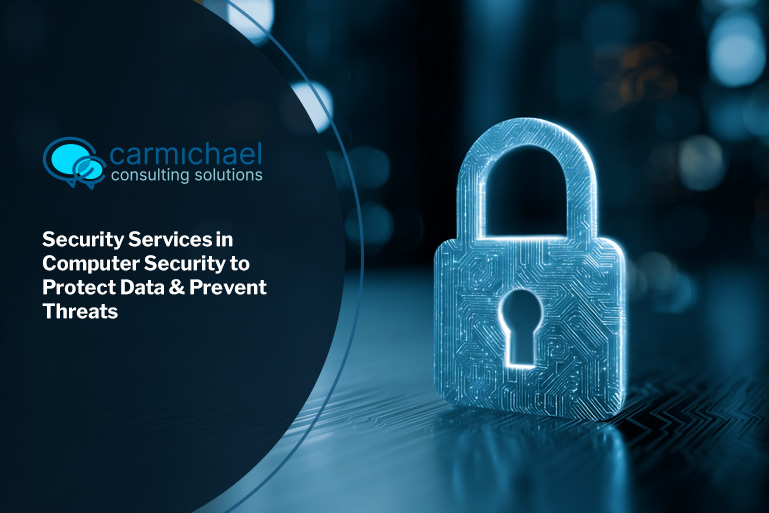
Security services in computer security are essential for keeping your business safe from growing cyber threats. Whether you're managing sensitive information or trying to prevent unauthorized access, having the right security measures in place can make all the difference. In this blog, you’ll learn what these services include, why they matter, and how to apply best practices to protect your data. We’ll also explore cloud security services in cloud computing, multi-factor authentication, and how to safeguard against phishing attacks and data breaches.
[.c-button-wrap2][.c-button-main2][.c-button-icon-content2]Contact Us[.c-button-icon2][.c-button-icon2][.c-button-icon-content2][.c-button-main2][.c-button-wrap2]
Security services in computer security refer to the tools and processes used to protect IT systems, networks, and data from cyber threats. These services help businesses prevent unauthorized access, detect vulnerabilities, and respond to incidents quickly.
They include a wide range of solutions, such as firewalls, intrusion detection systems, antivirus software, and encryption tools. For businesses, these services are not just technical add-ons—they are a core part of a reliable security strategy. Without them, your company is at risk of data breaches, service disruptions, and financial loss.

To protect your business effectively, you need a layered approach. Here are several strategies that can help you build a strong cybersecurity foundation.
MFA adds an extra layer of protection by requiring users to verify their identity in more than one way. It reduces the risk of unauthorized access, even if passwords are compromised.
Outdated software often contains known vulnerabilities. Regular updates and patches help close security gaps and keep your systems protected against new threats.
Phishing attacks are one of the most common ways hackers gain access to sensitive data. Training your team to recognize suspicious emails can prevent costly mistakes.
Real-time monitoring helps detect unusual behavior early. This allows your IT team to respond quickly before a minor issue becomes a major data breach.
Encryption ensures that even if data is intercepted, it cannot be read without the proper decryption key. This is especially important for customer information and financial records.
Frequent backups protect your business from data loss due to ransomware, hardware failure, or accidental deletion. Store backups securely and test them regularly.
Limit access to sensitive systems and data based on job roles. This reduces the risk of internal threats and accidental exposure.
Reliable cybersecurity services should include:

Network security is the backbone of your IT infrastructure. It ensures that your systems remain available, reliable, and secure. Without it, cybercriminals can exploit weaknesses to disrupt operations or steal data.
A strong network security setup includes firewalls, intrusion prevention systems, and secure configurations. These tools work together to block unauthorized access and monitor traffic for suspicious behavior. For businesses in Atlanta, where tech adoption is high, staying ahead of threats is not optional—it’s necessary for survival.
Different services protect different parts of your IT environment. Here’s a breakdown of what to consider.
These are outsourced services that handle everything from monitoring to incident response. They’re ideal for small to mid-sized businesses without a full-time security team.
This focuses on securing devices like laptops, desktops, and mobile phones. It includes antivirus, anti-malware, and device control tools.
These protect data and applications in cloud environments. They include access controls, encryption, and workload protection.
Email is a common entry point for cyber threats. Email security tools filter spam, detect phishing, and block malicious attachments.
IAM ensures that only authorized users can access specific systems and data. It includes password policies, MFA, and user behavior monitoring.
SIEM tools collect and analyze security data from across your network. They help detect threats and support compliance reporting.
Having a plan in place helps your team respond quickly and effectively to security incidents, reducing downtime and damage.

When choosing security services in computer security, it’s important to think long-term. Your needs today may not be the same a year from now. Look for solutions that can scale as your business grows.
Start with a risk assessment to identify your most critical assets and vulnerabilities. Then, prioritize solutions that offer flexibility, automation, and support for hybrid environments. Don’t forget to include employee training and regular audits in your security strategy.
To keep your systems secure, follow these best practices:
These steps help protect your business and ensure your security services remain effective.

Are you a business with 10 to 350 employees looking for dependable security services in computer security? If you're growing and need to protect your data, systems, and people, we can help you build a reliable and scalable security strategy.
At Carmichael Consulting Solutions, we specialize in helping businesses secure their IT environments with tailored solutions. From managed security services to cloud security services in cloud computing, our team is ready to support your goals. Contact us today to learn how we can help protect what matters most.
[.c-button-wrap2][.c-button-main2][.c-button-icon-content2]Contact Us[.c-button-icon2][.c-button-icon2][.c-button-icon-content2][.c-button-main2][.c-button-wrap2]
A security service is a tool or process that helps protect your IT systems from cyber threats. It includes things like firewalls, antivirus software, and monitoring tools. These services help prevent unauthorized access, detect vulnerabilities, and respond to incidents quickly.
By using the right security service, you can safeguard sensitive information, reduce the risk of a data breach, and maintain business continuity. They are essential for businesses that rely on digital systems to operate.
Cybersecurity is critical because small and mid-sized businesses are often targeted by hackers. They may not have the same defenses as larger companies, making them easier targets. A single data breach can lead to financial loss, legal issues, and damage to your reputation.
Using cybersecurity services helps protect your data, systems, and customers. It also ensures that you meet compliance requirements and avoid costly downtime.
Network security focuses on protecting the infrastructure that connects your systems and devices. It includes tools like firewalls, intrusion detection systems, and secure configurations. These tools help block unauthorized access and monitor traffic for threats.
Other types of cybersecurity may focus on endpoints, cloud environments, or applications. Together, they create a layered defense that helps protect your business from different angles.
Authentication is the process of verifying a user’s identity before granting access to systems or data. It helps prevent unauthorized access and keeps sensitive data safe. Common methods include passwords, PINs, and multi-factor authentication.
Strong authentication practices reduce the risk of cyber threats like phishing and credential theft. They are a key part of any security strategy.
To protect sensitive data, use encryption, strong access controls, and regular backups. Make sure only authorized users can access critical information. Train employees to recognize phishing attacks and avoid risky behavior.
Security measures like firewalls and intrusion detection systems also help protect your data. Regular audits and vulnerability scans ensure that your defenses stay strong.
Start with a risk assessment to identify your most important assets and potential threats. Choose solutions that match your needs and can grow with your business. Use secure configurations and update systems regularly.
Train your team on security awareness and test your defenses often. These best practices help protect your business and ensure your security services remain effective.
